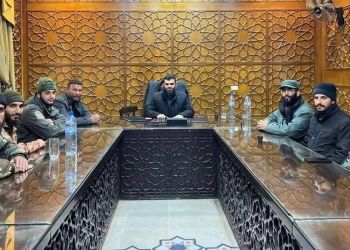This post is also available in:
![]() العربية
العربية
Exclusive report by D24 Network.
Deir Ezzor is of greater significance and considered as one of the most dominant and outranking provinces when it comes to the Syrian agricultural production and this is due to its possession of multiple factors and means that enables it to produce several and various agricultural goods.
Despite the exclusion the province was subjected to by the Assad-regime, Deir Ezzor maintained its remarkable position in the domain of agriculture, mainly the cultivation of wheat, which is a key crop in Syria, cotton, corn, sugar beet and other agricultural productions. In spite of its preeminent role in Syria, the province went on economically and scientifically backward for years due to the exclusion it faced under the rule of Bashar al-Assad.
Agriculture in Deir Ezzor relied solely on manual labor for decades. The process of mechanization along with medium and large agricultural projects were unattainable. Every year, large tracts of agricultural land became out of commission. Even the so-called “Agricultural Reform Projects” that were once introduced by the Assad-regime did not bring the desired results as it took the officials in charge of these projects a very long time to implement them to help improve the situation of agriculture in the province. There was also the problem of corruption within the Agricultural Administration in the province, which handed over the agricultural and farming projects to people close to the Assad forces such as Di al-Hima Shaligh, cousin of Bashar al-Assad.
The leading concern of these so-called officials and their organizations was focused on the means by which they could earn superstitious profits at the expense of the quality of production, which had a disadvantageous impact on the life of the farmer in Deir Ezzor who ended up later being the poorest citizen in the Syrian society.
Abu Mohamed, a farmer and a graduate of the veterinian Institute in Deir Ezzor, shed light on the situation of farmers under the rule of the Assad-regime by saying,
“Despite the claims that the farmer has the right to control his land as he wishes and that he is also given a role in the process of legislation, the farming class was the most class that faced oppression, subjugation and exclusion for decades. All of the Assad-forces; al-Baath party and some organizations like Farmers Union made these deceptive claims, which changed nothing for the better and produced in return bitter fruits with regard to the situation of farmers in Deir Ezzor province.”
The voice of the farmers in Syria remained voiceless, and caught between the oppressive rules imposed on agriculture by the regime and the sky-high increase in the prices of agricultural materials and seeds. Corruption within the agricultural associations played also a significant task in turning the situation of farmers into a total nightmare.
As regard the livestock, it witnessed a sharp drop in its production when compared to other countries in the world. Deir Ezzor province faced a sharp decline in the livestock that includes both domesticated and non-domesticated wealth.
The last years of the twentieth century witnessed the extinction of many wild animal species due to the wrong policies practiced by the Assad-regime at the time. With regard to the livestock, its numbers have fallen because of the limited number of educators and their focus on other domains, also due to the high prices of feed and the increase in taxes imposed by Assad forces. All of these reasons led to the decline in both the agricultural and livestock sectors during the rule of the Assad.
With the start of the revolution of dignity in Syria, which was followed by the liberation of several areas from the oppressive Assad-regime, the suffering of farmers increased to a higher degree because of the following factors:
- Many agricultural lands were rendered out of commission due to their close positions to the battle zones.
- Airstrikes and heavy artillery doubled the losses for the farmers by deliberately targeting their agricultural corps during season of cultivation.
- Many farmers martyred while some joined the ranks of the FSA, leaving their agricultural lands behind, which caused them to lose their fertility.
- Most of the irrigation stations and canals that were operated at the time were rendered out of service as the Assad forces systematically targeted them. Several pumping engines in both east and west Deir Ezzor countryside were pulverized, leaving most of the agricultural lands in the region without water.
- The high prices of seed and fertilizers whose plants are still under the regime control.
- The fertilizers that were imported remained subjected to the authority of the merchants who kept manipulating their prices to the degree they desired.
- The high prices of petroleum products led to an increase in the prices of agricultural mechanization to a very high rate.
- The regime warplanes deliberately targeted the agricultural mechanisms used to cultivate lands, which led to death of many workers operating them during the air strikes.
After Daesh seized control over Deir Ezzor, the suffering of farmers in the province changed from bad to worse. As it introduced new tight measures to regulate agricultures, which was met by the majority of farmers being afraid of cultivating their lands. In addition, entire families were displaced from their villages in the countryside, which left the agricultural lands in those villages out of commission, and caused the death of livestock, including chickens, cows and sheep. It also confiscated the livestock of some civilians regarded as “apostates “by the group.
Abu Hussein, an agronomist and a former employee at the Euphrates Basin Directorate, says, “because of the military operations and the continuous airstrikes and shelling, the suffering of farmers has increased. They are just like any civilian in the province who have been subjected to displacement, shelling, murder and so on. They left their main source of income when they fled for their lives. With the arrival of Daesh, it has issued new rules that made their lives even worse.
The organization formed its so-called “Agricultural Department” which is in charge of the agricultural process in the region. It has issued a bunch of rules that revolved around taxes imposed on the farmers who have already been facing several tough issues.
The prices of seeds have kept up to rise that 1 kg of wheat costs now 60 to 75 Syrian lira. It has caused farmers in Deir Ezzor to abandon the cultivation of other crops because of not being able to afford their costs. With regard to fertilizers, they have become as a rare currency as the price of a bag of fertilizer has reached 10000 Syrian lira (almost 500 US dollar for one ton). The Deash’s agricultural department has also imposed unfair rules regulating the crops that can be cultivated and limiting them to specific sizes.
The main issue that burdened the farmers in Deir Ezzor was the tax imposed on the irrigation of agricultural lands by the group. Given the fact that Daesh had played no role to provide the necessary means to operate such stations. Irrigation was and is still done through the use of irrigation stations that has been functioning since the province was under the rule of the regime.
The Agricultural Department belonging Deash has also relied upon experience and talents of some volunteers from Deir Ezzor province in order to fix damages in these stations. The tax imposed on the irrigation of lands has reached 1000 to 1500 Syrian lira for one acre. It is noteworthy to mention that the tax varies depending on the types of crops as well.
Abu Hussein adds, “One acre of wheat costs now the farmers around 800 to 10000 Syrian lira. The questions that arises here is where are the profits which the farmers are supposed to make out of this? Where do the efforts and money spent on the agricultural lands by the farmers go?
There is also the total absence of accountability concerning the merchants in the province who can still change and manipulate the prices of the agricultural goods sold by the farmers. There is no rules by which the organization regulates selling the crops, creating another obstacle for the farmers to sell them.
After all of this the Daesh’ so-called Zakat Department continues to make the situation of the farmers even harsher, troublesome and more exhausting by imposing arbitrary taxes upon them. The taxes are measured by the amount of the agricultural production of each farmer; however, the crops that are produced from the agricultural lands do not even suffice the basic needs of the farmer himself.
A group of farmers in Deir Ezzor comment on the grievous and distressing situation they are going through by saying,
“ We are not against paying the Zakat, which is an obligation upon us as Muslims, however, the increase in the number of taxes imposed upon us, in addition to the high prices of both salaries and raw materials; including seeds and fertilizers, have made it very difficult for us to cope up with the current situation under Daesh’s rule in the province. The duty of every one of us (the farmers) is to exhaust ourselves by spending all of our valuable time in our agricultural lands to produce crops and then give most of them as taxes to the Zakat department in the province.”
The suffering of farmers in Deir Ezzor continue to change from bad to worse for every day that has passed, mainly after Daesh prohibited agriculture in the areas of al-Badiya under the pretext that they are lands belonging to the Muslims.
Thus, the farmer in Deir Ezzor is again the weakest and most negatively affected player in the series of unjust, unprincipled and inequitable laws and taxes imposed by Daesh and exploitation by greedy merchants.










